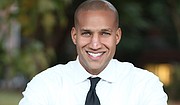JACKSON — Dr. Timothy Quinn and I have been friends for years. In fact, our mothers worked for the same company. We, like many others, have a parent that has been with the same employer for many years. After graduating college and entering into corporate America, our parents placed a significant amount of emphasis on the importance of sound retirement financial planning early on in our careers.
Although Quinn has a private practice and I run my own international beauty corporation, Lea's Luxurious Locks, LLC, we used to work in corporate America. In fact, we, like many others, wouldn’t even consider working with an entity or base our tenure with an entity if it did not offer a favorable retirement plan. Although Quinn and I agree that sound and consistent retirement financial planning is absolutely crucial to one’s financial security, we also believe health and emotional planning are as equally crucial in the post-employment world. Aside from observing the joy our parents had looking forward to not having to go to work every day after 40 years and we, as the children, dreaded the extra time they would have on their hands to call us fussing, Quinn and I discussed how many children have taken the time to examine their parents’ emotional and physical states of beings in regards to their new outlook on the second half of their lives.
Pre-retirement or transitional counseling that focuses specifically on health and emotional well-being can be extremely beneficial to retirees because it allows them to fully understand and actually quantify their physical and emotional well-being. Although many companies offer pre-retirement counseling free of charge through programs such as the Employee Assistance Program, it may be better to start with one’s primary-care physician. A primary-care physician can professionally evaluate whether or not an individual may or may not need specialized transitional counseling and refer the patient to the appropriate counseling professional.
In addition, during the retirement process, the retiree has an excellent opportunity to develop a closer relationship with his or her primary-care physician to more closely monitor his or her health. The retirement process may allow for healthier eating habits, including healthier food selections and will most certainly allow the time for a daily exercise regimen of some sort.
Quinn’s mother recently retired from her 30-year career. He took her out to dinner to discuss his concerns about her future. While there, he talked about how people’s minds are muscles that require exercise to maintain optimal strength. He told her that his drill instructor in the military used to always say, "If you don’t use it, you will lose it." He also told her that many patients who retired from an active career and immediately transitioned to a sedentary lifestyle with no daily routine with requirements had a drastic deterioration of their physical and mental health.
"Our bodies and minds are meant to be challenged daily with a routine of objectives," he said. "This gives us the purpose we need to function and maintain our health. It is okay to have a transition of responsibility with fewer requirements, but to abruptly change from a busy career to nothing is not healthy.”
Together, they made the decision to allow his mother to come to his practice and work in an abbreviated capacity. She agreed to this decision, but told him that she was the boss, and he would be Timmy. So far, other than the snickering from Quinn’s employees when his mom reprimands him at work, he thinks everything is going well. He thinks.
Take some time to evaluate your loved ones’ outlook on retirement, aside from the financial aspect. You may want to encourage them to talk to their primary-care physician about their upcoming retirement and, in turn, the retiree may be able to fully maximize the enjoyment in that time period.




Comments
Use the comment form below to begin a discussion about this content.
comments powered by Disqus